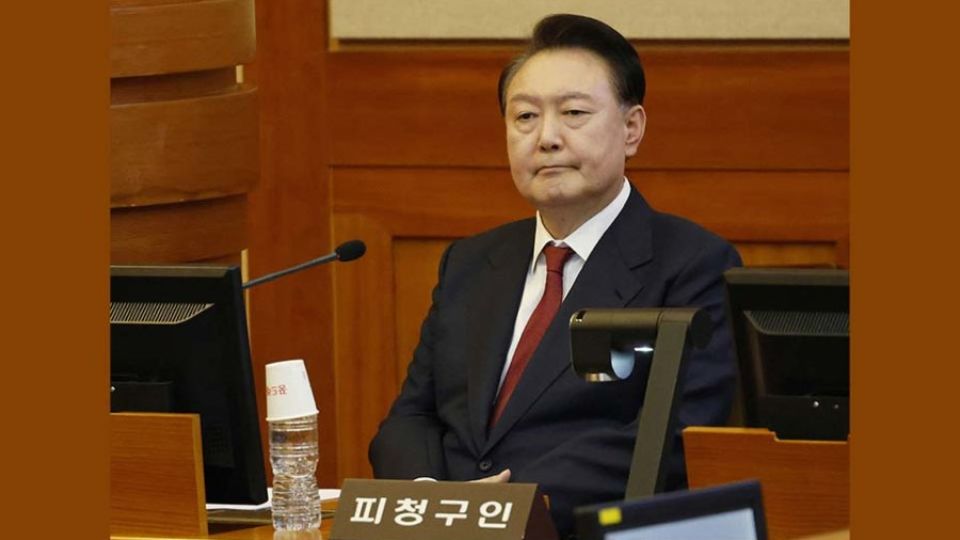January 27, 2025
SEOUL – South Korean prosecutors indicted President Yoon Suk Yeol on Sunday over charges of insurrection, after Prosecutor General Shim Woo-jung convened a meeting with senior prosecutors on the same day.
Prosecutors said they indicted Yoon as “concerns about destruction of evidence remain unresolved.”
With the arrest warrant set to expire on Monday, the prosecution had to choose between releasing President Yoon or indicting him with arrest to keep him in custody. Although the prosecution received the case from the Corruption Investigation Office for High-ranking Officials on Thursday, it didn’t have a chance to question him. Indicting him means the trial begins without any further prosecutorial investigation.
The prosecution discussed the matter with the chief and deputy chief prosecutors from the Supreme Prosecutors’ Office and district prosecutors’ office Sunday morning.
Park Se-hyun, a chief prosecutor at the Seoul High Prosecutors’ Office who also headed the special investigation headquarters for the Dec. 3 martial law attempt, told reporters following the meeting that Prosecutor General Shim “will make the final decision.”
The prosecution was believed to be considering an indictment against Yoon on charges of leading an insurrection, with Yoon to be arrested and held for up to six months, upon the court’s approval.
Although Yoon was under arrest under a separate warrant already, he refused to appear for questioning six times, except for the first day’s interrogation, during which he remained silent.
While detained prior to his formal arrest, Yoon attended the Constitutional Court’s hearings, footage of which was released by the court and aired nationwide by local broadcasters.
The court’s consecutive rejections on Friday and Saturday left the prosecution with little choice but to indict him sooner than expected.
On Saturday night, the Seoul Central District Court rejected the prosecution’s request to extend the detention period until Feb. 6, saying that the extension was neither necessary nor justifiable.
This not only complicates the prosecution’s plan to conduct a face-to-face interrogation of Yoon by visiting the Seoul Detention Center during the Lunar New Year holiday, but also puts pressure on them to proceed with the trial based on the evidence gathered so far, with no possibility of further physical investigation.
Other key military commanders involved in the case have already been indicted.
Given the indictment of former Defense Minister Kim Yong-hyun, a key figure believed to have colluded with Yoon in the Dec. 3 incident, the same charges and evidence will apply to Yoon’s indictment.
The CIO, which initially handled Yoon’s investigation, submitted some 30,000 pages of investigation records as well as testimonies of around 10 high-level military and police officials related to the Dec. 3 incident.
The Constitutional Court, meanwhile, has conducted the fourth of eight hearings so far, and is required to either uphold or overturn Yoon’s trial before June 11.
Meanwhile, the rival main political parties remained deeply divided.
People Power Party spokesperson Shin Dong-wook criticized the prosecution’s second attempt to extend Yoon’s detention, saying “the resulting backlash will fall directly on the prosecution,” demanding that any further investigation be conducted “under due process without detention.”
Shin also demanded that the CIO be dismantled, claiming that illegal investigations and procedural violations occurred during Yoon’s arrest and detention. He warned that CIO officials, including its chief prosecutor Oh Dong-woon, should face “severe criminal responsibility.”
The opposition Democratic Party urged Yoon’s indictment.
The party’s spokesperson Jo Seoung-lae said in a statement that the court had already limited the prosecution’s authority to decide on an indictment, making the reapplication “inappropriate.”
“Despite Yoon’s refusal to cooperate, there is abundant evidence proving his guilt. The prosecution, CIO and police have gathered substantial evidence while investigating and prosecuting individuals involved in the insurrection. Indicting the leader of rebellion aligns with the public’s sense of justice and the need to end the ongoing turmoil.”


